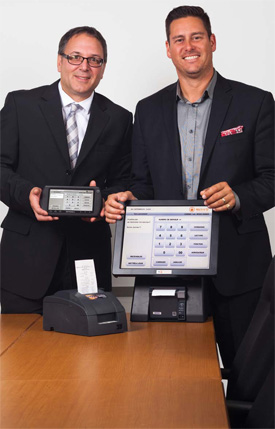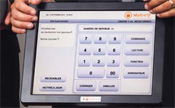2 Quick Fixes To Stagnating POS Sales
By The Business Solutions Network
This VAR’s decisions to sell new IT solutions to its existing hospitality clients and expand into a new market were critical to its projected 10% revenue growth this year.

With nearly 34 years of experience in the hospitality market, POS Terminal 2000 is no stranger to adapting its business to remain competitive. Further proof of this VAR’s sustainability is the fact that it’s the number one Maitre’D POS software reseller in the world with nearly 2,000 customers using its solution in the greater Montréal area. In late 2009, however, the reseller saw its sales start to stagnate, and it realized that its future sales in the local hospitality market were becoming saturated. It also recognized that this situation would only get worse unless something changed. After a few brainstorming sessions among its line-of-business and executive teams, a plan was put in place to find new, complementary IT solutions and services to sell to its existing client base and simultaneously to identify opportunities in new markets where it could leverage its existing knowledge and skills.
Sell Mobile POS Solutions In Hospitality
Steven Raymond, director of sales at POS Terminal 2000, admits that he had been thinking about the idea to sell mobile POS solutions ever since he started with the company in 2006. Coming from a background in hospitality with years of experience as a waiter and restaurant manager, he understood the potential for this technology to make a positive impact with customers. There were two things that kept POS Terminal 2000 from selling mobile POS sooner: finding the right form factor and platform. “Our POS vendor had mobile versions of its software for years, but none of the handhelds we tested were a good fit,” recalls Raymond. “For customers with large menus, it just wasn’t practical to scroll through several screens to locate the right item. Plus, there were just a couple of mobile platforms to choose from, which further limited our choices of devices.”
It was after the first iPad was released in 2010 that Raymond knew things were moving in the right direction for mobile POS. “The iPad led a major interest and upsurge in tablets, plus it led to the dominance of iOS and Android in the mobile platform space,” he said. Although the original iPad was a better tool than previous options for tableside order taking, the VAR felt the tablet lacked a few key features to be a viable option for his needs. “The original 9-inch model was a bit too large to hold in one hand and carry around, plus if the battery dies during a work shift, the device is out of commission while it’s being charged,” he says. Another area of concern that Raymond and POS Terminal 2000’s product evaluation team had was the fact that iPads aren’t rugged. “Restaurants are fastpaced work environments with hard surfaces, which are two things that don’t go well with most consumer devices,” he says.
In 2012, BlueStar, the VAR’s distributor partner, introduced it to the Motorola ET1 Enterprise Tablet, a 7-inch Android tablet that was the right size and could withstand multiple falls onto concrete. After testing the ET1 and confirming its compatibility with the Maitre’D software, POS Terminal 2000 was ready to start selling it. “Getting started was the biggest challenge because there were no mobile POS systems being used in Montréal at the time to point to as examples,” says Raymond. “BlueStar and Motorola were instrumental at helping us break the ice by providing us with several demo units that we could use to allow customers to try it out for several weeks before they made a purchase decision.”
After the VAR was able to sell mobile POS solutions to a couple of restaurants, it added another component to its marketing plan. “We would take prospects out to lunch or dinner at restaurants using our tableside ordering solutions and allow them to see firsthand how much nicer it made the dining experience for the customer as well as the wait staff,” says Raymond. “About six months after selling our first mobile solution, we no longer needed to contact customers about it — they were calling us and asking for it.”
Don’t Overlook The Wireless Network
It didn’t take POS Terminal 2000’s competitors too long to see what was happening and to start selling their own tableside ordering solutions with varying degrees of success. “This type of solution looks much easier to deploy than it really is,” says Luc Girard, owner of POS Terminal 2000. “Some VARs discover this the hard way after a customer’s tablet freezes up as it’s about to complete a large order.” In the same way that it’s important to use rugged mobile devices that are built for the workplace, it’s equally important to avoid using consumer-grade wireless routers and other networking equipment. “Consumer-grade network equipment is more prone to wireless dead spots and freezing up under heavy use,” says Raymond. The VAR bundles the ET1 devices with Motorola’s Mobility Services Platform, which enables administrators to access data, manage content, remotely wipe and push apps, add updates and add patches to devices individually or simultaneously in large groups. “Another nice benefit of using the Motorola wireless platform with the Motorola tablets is that the platform has built-in intelligence that enables it to extend the battery life of the devices,” says Raymond. “Each device also features a swappable battery plus an additional memory-backup battery that ensures there’s no data loss if the main battery dies.”
From Hospitality To The Retail Market
In addition to selling mobile POS, the second conclusion from the company’s brainstorming session was that the retail market was rife with new business opportunities. “The IT hardware and software used in both markets is nearly identical, plus we were already staffed for round-the-clock support seven days a week,” says Raymond.
Even though the Maitre’D POS software could be used for some retailers, such as butcher shops and bakeries, the VAR had to explore other options for convenience stores (c-stores), grocery stores, and specialty retailers. After researching several retail POS solutions, POS Terminal 2000 selected Québec-based Logivision, manufacturers of the L-BOSS integrated store controller software for retailers. “The fact that this company has been around for 20 years, it was local, and it was very familiar with the needs of the Montréal retail market were primary drivers behind our decision to become Logivision resellers,” says Raymond. “What’s also nice is that both Maitre’D and Logivision are partners with Touch Dynamic, our all-in-one touch computer, display, cash drawer, and receipt printer vendor partner. Since we’re already very familiar with the Touch Dynamic product, and it’s a fit for hospitality, retail, and just about any other vertical market, it makes our transition into a new market that much smoother.”
After working with its POS software vendor to train its salespeople on the product, POS Terminal 2000 developed a plan for approaching decision makers in the new market. “We knew there was going to be some trial and error involved in the transition process, so we chose to have salespeople focus on SMB retailers to get a better understanding of their needs during the initial learning stages,” says Raymond. “One of the biggest lessons we learned right away is that talking to retailers about our hospitality experience actually hurt our chances of winning business with the retailers because they believe their business needs are so different from restaurants’.” As soon as salespeople learned how to replace their hospitality sales lingo with retail-specific sales pitches, the VAR started closing deals in retail, and today this market accounts for 10% of its overall revenue.

One event that put a temporary damper on POS Terminal 2000’s foray into the retail market was a 2011 government mandate that impacted all of its hospitality customers. “The ‘Mandatory Billing in the Restaurant Sector’ law requires all restaurants to install a special tamper-proof appliance between their POS systems and receipt printers, as a measure to reduce sales reporting fraud,” says Raymond. As a result of the mandate, which affected 19,000 restaurants in Québec, POS Terminal 2000’s sales doubled in 2011. “The only downside to our 2011 sales growth was that it really set us back in our retail growth and expansion,” says Raymond.
Future-Proof Your Business With Recurring Revenue Sales
Starting early last year, POS Terminal 2000 refocused its efforts on the retail market, and between new sales in retail combined with its mobile POS sales in hospitality, it’s on track to reach 10 percent revenue growth this year.
The VAR is already hard at work focusing on new opportunities that will help it continue its growth trend. For example, it plans to roll out digital signage and POS As a Service in early 2014. “On the digital signage front, we’re looking at Revel Digital, which integrates with the Maitre’D POS software,” says Raymond. “Any price changes made in the POS software are automatically updated on the digital signage display. Plus, the digital signage software is hosted in Revel Digital’s cloud, and it’s sold as a subscription, which will translate to recurring revenue streams for our company.”
“We’re still going to give customers the option to pay for the software licensing all up front if they wish, but for those who want to reduce their up-front capital expenses or prefer a more predictable IT expense model, this [POS software as a Service] will meet those requirements,” Raymond explains. “This business model isn’t very prevalent right now in our area, but like other business strategies we’ve implemented, we’re perfectly comfortable being the first to sell a new solution or service that benefits our customers and us.”

